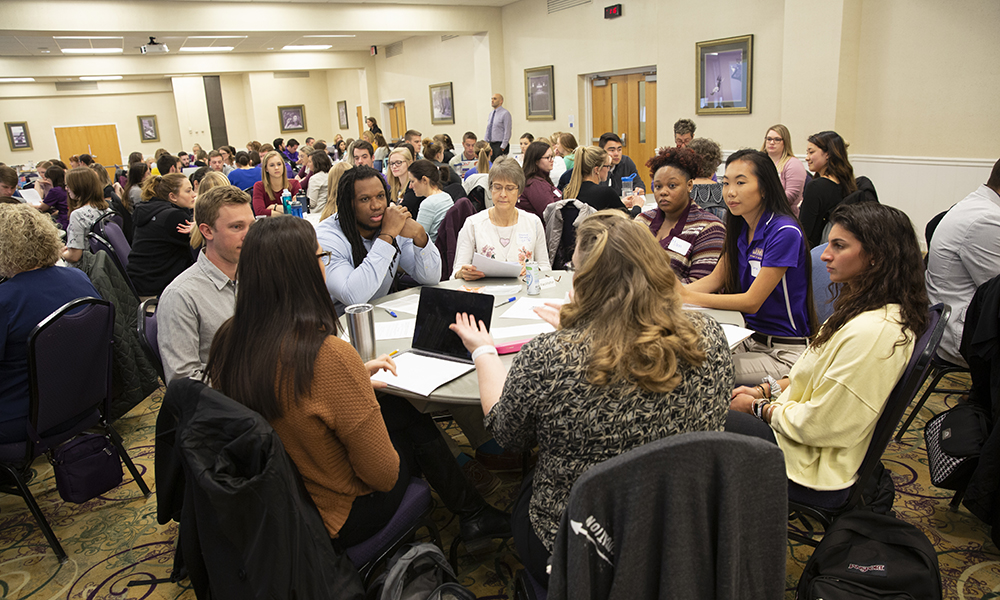The importance of interprofessional education in healthcare
College of Health and Behavioral StudiesBy: Shannon Shevlin
Creative Services Student Writer

In order to provide effective care, professionals from different healthcare professions must understand each other and work together. These ideas about holistic care and interprofessional cooperation are critical to the wellness of a patient, and integrated throughout the College of Health and Behavioral Studies’ (CHBS) program curricula. In March 2019, JMU’s Department of Health Professions (HP) organized an interprofessional education (IPE) event where students and faculty across program lines collaborated on a complex case study to improve awareness of each interprofessional role in providing patient centered care.
During the event, students were given a patient scenario where they first identified patient needs and prepared individual responsibilities. Then, all professionals gathered to discuss their specialized roles and coordinate care of the patient. This semester’s case study involved a 20-year-old patient who sustained a spinal cord injury during a college football game. From athletic trainers who evaluated the injury to occupational therapists who rehabilitated the patient, practicing coordinated care not only enhanced student awareness about different roles on a care team, but also promoted learning and effective communication across disciplines.
More than 90 students from athletic training, dietetics, health services administration, occupational therapy (OT) and physician assistant (PA) programs participated. In addition, 25 faculty members from the Department of Health Professions in addition to Social Work, Nursing, Libraries and IIHHS were represented to facilitate the event.
PA faculty member Whitney Simmons understands the importance of collaboration on a care team. With a clinical background in primary care, Simmons serves as Chair of the IPE Committee for Health Professions, and is confident the event will strengthen graduates’ core competencies. Simmons reflected on the goals of this event and said, “As healthcare professionals, our responsibility is to provide the best patient care possible. By collaborating with others we are able to provide team-based care which gives patients the best results.”
Student attendees found the experience to be highly valuable and will use its message in their future careers. PA student Ingrid Brown explained how collaboration is important from the onset of injury or illness through recovery. She said, “It was humbling to hear details about how different professionals approach the same patient and what they are able to accomplish. It made me appreciate everyone working in patient care because none of us would be able to do our job to its full potential without one another.” Health services administration major Kelly Chung expressed, “It helped me understand the team aspect of healthcare and how different roles are vital to the process. It’s important to know why clinicians make decisions and how those affect patient and business outcomes.”
Student engagement is critical, as outcomes suffer when professionals act alone. Poor communication on the care team leads to costly and preventable mistakes in hospitals ranging from medication errors to fatal safety accidents. Benefits of interprofessional collaboration include fewer preventable errors, reduced healthcare costs and improved relationships across disciplines. Breaking down these communication and information barriers to effective care is critical and will improve the lives of patients for years to come. The event inspired students to achieve the benefits of IPE beyond the classroom, showing how everyone benefits when professionals choose an integrative approach to care.

